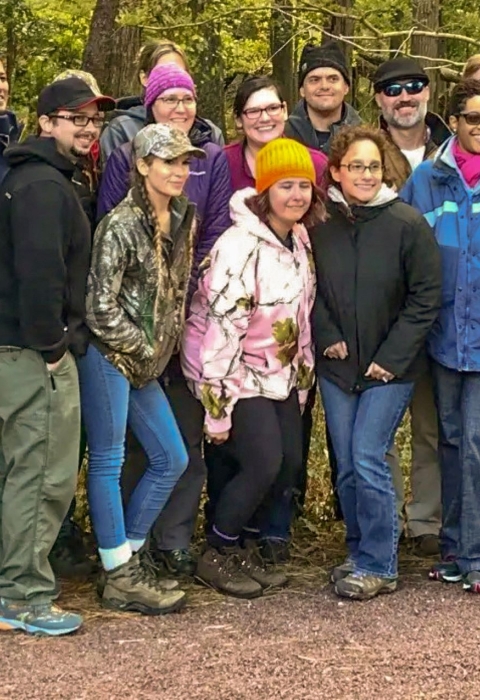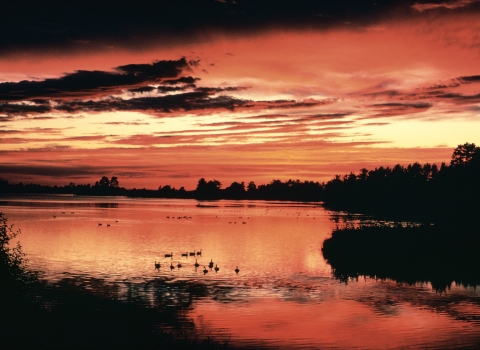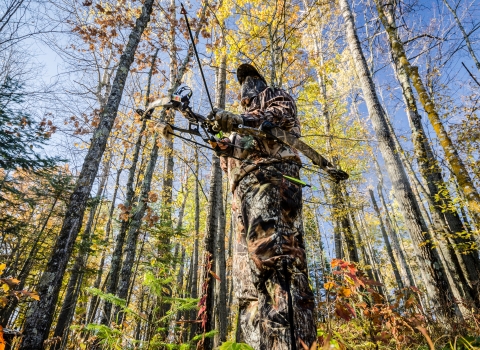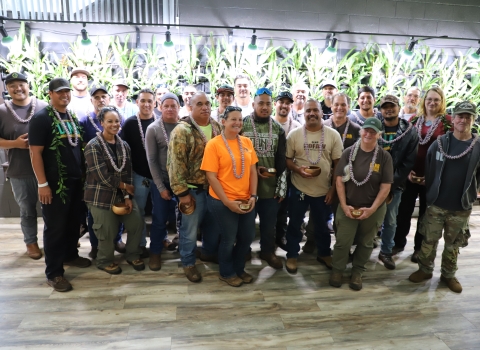A month ago, I had never met Tasha. And now there we were in a blind together, staring down an old logging road in the woods as first light gradually peeked through the dark canopy, and inside I was just as excited as if it were my own first hunt. But it wasn’t. It was Tasha’s.
The night before she asked me if it was normal to feel so anxious, and I said yes. For me, the excitement and anxiety often mesh together, especially before opening day, even now 20-some years into hunting. I accept it and do not let it stop me. I wasn’t exaggerating. I still get that excited for my first hunt of the year, or during the rut when I see all the conditions have come together for a potentially great hunt the next day.
I told her, “Wait until you see your first deer in the scope. That’s why we practiced the breathing routine before and during the shot at the range. You will need it!”
When we started First Shot in 2018, a mentored hunt program for adults who didn’t have the network to help them learn to hunt, we knew we didn’t want it to be just a guided hunt or a one-day event. We wanted it to be a program that served as a stepping stone to helping adults of varying backgrounds, experiences, and ages to gain the confidence and competence for hunting on their own one day. We wanted the mentors to form a relationship with the mentee, but I had no idea what impact it would have, not only on them, but on us as mentors.
As the refuge manager at Blackwater National Wildlife Refuge, and an “adult-onset hunter,” I wanted to create a program with our partners, the National Wild Turkey Federation (NWTF) and Maryland Department of Natural Resources, that would help fill a void in the world of R3 (Recruitment, Retention and Reactivation). I was “recruited” by my ex-husband and a Becoming an Outdoorswoman event, then lapsed after the divorce and was “reactivated” when I began my position at Blackwater, thanks to two of my friends who were also “huntresses.” They understood my challenges and concerns and helped me through each one, from learning to use a climber to getting a deer out by myself.
How could we facilitate that here at the refuge, where we had a strong base of 5,000-plus hunters and ample opportunity?
When I met Russ Leith with the NWTF Maryland Chapter, we put our heads together to start something centered around turkey hunting, which had become my favorite pursuit. We contacted Chris Markin, Maryland Department of Natural Resources’ R3 coordinator, and wild turkey biologist Bob Long, who eventually became my husband (and best hunting partner ever).
That first hunt for turkeys was a success, but we realized we had more opportunity to engage new hunters by expanding to deer in the fall. Turkeys are fun but can be more challenging in our area, especially for new hunters. Since inception, over 100 mentees participated in the turkey, deer, or both hunts, with some mentees now serving as mentors themselves, and others helping teach the workshop. Evaluations show over 80% continue to hunt.
All the background and statistics explain the program, but they do not tell the stories of the impact upon the individuals, mentee and mentor alike. Hunting has connected us. I could have told folks that early on, but even now I continue to be pleasantly surprised by the wonderful people I get to meet and the relationships we form.
The program also gave me a new avenue to connect with our refuge hunters. I reached out to a few names that I heard avidly hunt the refuge. As word of the program spread, I also had others proactively reach out to volunteer. I never would have had the opportunity to get to know them otherwise. They are generous with their time, and patient and supportive of their mentees.
A few weeks ago, I ran into one of the mentors from 2018, who was eating lunch at the local general store, Woolford’s, with his mentee and mentee’s family. They come down to hunt together every year, and that continuing relationships inspires me. We never intended nor expected for that to happen, but they did. I also love to hear of past mentees taking their spouses, kids and friends out hunting for the first time, too. This concept works: Help people learn to hunt themselves, and they will spread it with others.
Our fifth deer hunt concluded in early November. I find it hard to adequately describe the outcome of the program. I share the number of harvests, the number of mentor/mentee pairs and a few of the stories, but that does not properly convey the impact. It does not share how hunting helped one couple of mentees avoid divorce. Or the father who found a new way to spend precious time with his young son despite a busy career. The single mother who harvested a deer and can now bring home venison to her daughter. The mentee who had always wanted to hunt as a young girl, but her culture and family dismissed the possibility. Or the former vegetarian who wanted to eat only meat she harvested herself. Hunting, which was previously out of reach, has provided fulfillment and enjoyment in many different forms.
The mentees are not the only ones impacted. As a mentor, I, too, have learned from each one, and have grown myself. I recall how I doubted my own ability to serve as a mentor. I nervously did so only because we needed women mentors. I felt that it was important for mentees to see themselves in some of the mentors and share how we overcame our own challenges and doubts. Every mentor is different in multiple ways, many of which are not visible differences. My husband grew up hunting, but I did not. He is a father who has helped his sons learn to hunt; I have not, but I have been supported by women as I learned to hunt and know how that felt and what I needed. We each bring different perspectives to the table.
By overcoming my own lack of confidence, I gained the confidence I needed. I was able to relate to their uncertainty, which, in turn, helped them feel it was OK, and work through it. By helping five other women with their first successful hunts through First Shot, I also became a better hunter.
Every time you step into the woods you have the chance to learn something. Teaching others helps you become more receptive to learning yourself, and you never know what will happen or what you will encounter. In the end, it’s not the number of deer harvested, or the number of mentees, but the relationships we each take away.
As I reflect on Tasha’s hunt, and others over the years, I realize I have gained just as much, if not more, as the mentees. As we sat in the blind waiting and watching, she remarked how the sound of the wind through the leaves and the colors of the trees was calming, even meditative. She shared that when the deer appeared, despite being so nervous and excited before and after, she was surprised that she went into an almost out-of-body experience and calmly harvested her first deer.
I will cherish these moments, and I will fondly remember the genuine, warm embrace after she laid hands on her deer and realized she had indeed become a hunter.







